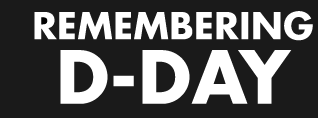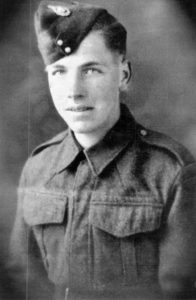I was born and brought up in Hilsea, Portsmouth. The war started on my 14th birthday. I was evacuated to the other side of Southampton for a year; then I came back and started working for the Co-op Dairy, helping with the milk rounds. I was delivering milk all through the bombings in Portsmouth and I helped my father on fire watch. The air raids would start after midnight so I would have gone to bed and you had to get up and it broke your sleep. Then you had to get up in the morning for work, so it was very tiring.
In 1942 at the age of 17 I decided to go to the Portsmouth recruiting office and sign up for the RAF because I was in the Air Training Corps but they said I was too young. Then a sergeant in the Royal Marines said I could join them instead, so I was taken on by the Royal Marines in January 1943. I was stationed at Eastney Barracks and then at Fort Gomer in Gosport. Our training included time in North Wales, Great Yarmouth and Dartmouth, where we spent six weeks learning basic seamanship and how to handle a landing craft.
I and three others were to man LCM (Landing Craft Mechanised) 1162. For around three months prior to D-Day we were stationed at Bracklesham with 652 Flotilla. We practised every day until 4 June, when we were given the order to move out. Just suddenly one morning they ordered us all to go to the landing craft. We did not really know what was going on until we got out into the Solent and saw all those ships there. Then they decided the weather was too bad so they delayed it for a day and we had to tie up somewhere and wait for 5 June. We were given a photograph of the beach we were to land on.
Once on the landing craft heading for JUNO Beach nobody spoke a word. Everyone was praying, whether they were religious or not, and wondering what’s going to happen when that ramp goes down and they hit the beach. I was worried about getting shot and laying down somewhere in agony. I remember thinking if I was going to die, I wanted to die quickly.
We travelled through the night from Chichester Harbour. The sea was very rough, but we were told that if anyone fell overboard, on no account were we to stop to pick them up. We finally reached Bernières-sur-Mer on the coast of Normandy at about 6.00am on 6 June.
We then had to transfer the four Canadian engineers, with all their equipment, from their ship onto our landing craft. The sea was still very rough and the landing craft was going up and down, so it took longer than we thought to do this. This meant we were late going in, reaching JUNO Beach at about 7.30am.
As we approached the beach, we came under fire from the German guns and, at the same time, our battleships opened fire. The noise was deafening – it was quite frightening. I had to go along the side of the landing craft ready to release the retaining pin, which would allow the ramp to go down as soon as we got to the beach. It was at this point that I lost my helmet. I obviously had not done the strap up properly. However, I did not have time to worry about it – I just had to get on with my job.
We reached the beach and down went the ramp. The four engineers, with a trailer holding their equipment, went down into the water which was not very deep. Their job was to clear the beach of any mines and to breach the sea wall. The Canadian troops came under fire as soon as they hit the beach and we saw many of them fall. The Canadians lost a lot of men that morning. We got off the beach. A lot of landing craft sank coming off the beaches, rather than going in. The tide was in to start with but when they came off the beach the tide was going out and mines came up from the water.
We slept on the beach on the night of D-Day and I remember a German plane coming over and flying very low. We were all firing at it. The next day I saw the Canadian casualties being buried on the beach. A bulldozer dug a trench and enough sand was used just to cover them up. But we still saw a few bodies floating on the tide even a week after D-Day. I remember I hadn’t eaten or washed and shaved for two days and I came across a beach party having breakfast and scrounged some from them. Then we started unloading all the ships by landing craft. Most of the boxes we unloaded seemed to be food. I stayed in Normandy for about six weeks before I was picked up by a ship and returned to the UK.
It was a sad time for me losing my friends. It still upsets me even now when I think of them, and how they gave their lives that day.

